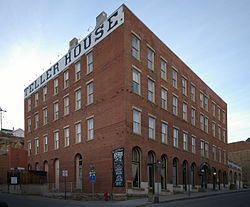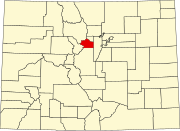Central City, Colorado
Central City, Colorado | |
|---|---|
 The Teller House in Central City | |
| Nickname: The Richest Square Mile on Earth | |
 | |
Location of Central City in the United States | |
| Coordinates: 39°47′41″N 105°30′44″W / 39.79472°N 105.51222°W[2] | |
| Country | |
| State | |
| County | Gilpin County[1] Clear Creek County |
| Settled | 1859 |
| Incorporated | June 12, 1886[3] |
| Government | |
| • Type | Home rule municipality[4] |
| Area | |
| 5.5940 km2 (2.1599 sq mi) | |
| • Land | 5.5937 km2 (2.1597 sq mi) |
| • Water | 0.0003 km2 (0.0001 sq mi) |
| Elevation | 2,649 m (8,691 ft) |
| Population | |
| 779 | |
| • Density | 139/km2 (361/sq mi) |
| • Metro | 2,963,821 (19th) |
| • CSA | 3,623,560 (17th) |
| Time zone | UTC−07:00 (MST) |
| • Summer (DST) | UTC−06:00 (MDT) |
| ZIP Code | |
| Area code(s) | Both 303 and 720 |
| FIPS code | 08-12910 |
| GNIS feature ID | 2409427[2] |
| Website | centralcity |
Central City is a home rule municipality located in Gilpin and Clear Creek counties, Colorado, United States.[1] Central City is the county seat and the most populous municipality of Gilpin County.[7] The city population was 779, all in Gilpin County, at the 2020 United States census.[5] The city is a historic mining settlement founded in 1859 during the Pike's Peak Gold Rush and came to be known as the "Richest Square Mile on Earth". Central City and the adjacent city of Black Hawk form the federally designated Central City/Black Hawk Historic District. The city is now a part of the Denver–Aurora–Lakewood, CO Metropolitan Statistical Area and the Front Range Urban Corridor.
History
[edit]

On May 6, 1859, during the Pike's Peak Gold Rush, John H. Gregory found a gold-bearing vein (the Gregory Lode) in Gregory Gulch between Black Hawk and Central City. Within two months many other veins were discovered, including the Bates, Gunnell, Kansas, and Burroughs.[8] By 1860, as many as 10,000 prospectors had flocked to the town, then known as Mountain City,[9] and surrounding prospects, but most soon left, many returning east.[10] The 1900 census showed 3,114 people.
The year 1863 brought the first attempt by hard rock miners to form a hard rock miners' union. Of 125 miners signing a union resolution in Central City, about fifty broke windows and doors at the Bob Tail mine, forcing other workers out. After a night of shooting and fighting, the union effort among Central City miners failed.[11]
Many Chinese immigrants lived in Central City during the early days working the placer deposits of Gregory Gulch. They were forbidden to work in the underground mines. Most of them are believed to have returned to China after making their stake.
The frontier gambler Poker Alice lived for a time in Central City and several other Colorado mining communities.[12]
Gold mining in the Central City district decreased rapidly between 1900 and 1920, as the veins were exhausted. Mining revived in the early 1930s in response to the increase in the price of gold from $20 to $35 per ounce, but then virtually shut down during World War II when gold mining was declared nonessential to the war effort. The district was enlivened in the 1950s by efforts to locate uranium deposits, but these proved unsuccessful.[8]
The population of Central City and its sister city Black Hawk fell to a few hundred by the 1950s. Casino gambling was introduced in both towns in the early 1990s, but had more success in Black Hawk (which has 18 casinos) than in Central City (which has 6 casinos), partly because the main road to Central City passed through Black Hawk, tempting gamblers to stop in Black Hawk instead. In an effort to compete, Central City completed a four-lane, 8.4-mile (13.5 km) parkway from Interstate 70 to Central City, without going through Black Hawk.[13] The highway was completed in 2004, but Black Hawk, which prior to the introduction of gambling was much smaller than Central City, continues to generate more than seven times the gambling revenue that Central City does. To compete, Central City has recently eliminated height restrictions for building on undeveloped land. Buildings were previously limited to heights of 53 feet (16 m), so as not to overshadow the town's historic buildings.[14]
Tax from the gambling revenue provides funding for the State Historical Fund, administered by the Colorado Office of Archaeology and Historic Preservation.[15]
Geography
[edit]Central City is located in southern Gilpin County. The city limits extend south along the Central City Parkway into Clear Creek County, as far as Interstate 70. The city is bordered by Black Hawk to the east and Idaho Springs to the south.
At the 2020 United States census, the city had a total area of 1,382 acres (5.5940 km2), including 0.07 acres (0.0003 km2) of water.[5]
Demographics
[edit]| Census | Pop. | Note | %± |
|---|---|---|---|
| 1860 | 598 | — | |
| 1870 | 2,360 | 294.6% | |
| 1880 | 2,626 | 11.3% | |
| 1890 | 2,480 | −5.6% | |
| 1900 | 3,114 | 25.6% | |
| 1910 | 1,782 | −42.8% | |
| 1920 | 552 | −69.0% | |
| 1930 | 572 | 3.6% | |
| 1940 | 706 | 23.4% | |
| 1950 | 371 | −47.5% | |
| 1960 | 250 | −32.6% | |
| 1970 | 228 | −8.8% | |
| 1980 | 329 | 44.3% | |
| 1990 | 335 | 1.8% | |
| 2000 | 515 | 53.7% | |
| 2010 | 663 | 28.7% | |
| 2020 | 779 | 17.5% | |
| U.S. Decennial Census | |||
As of the census[16] of 2000, there were 515 people, 261 households, and 101 families residing in the city. The population density was 273.0 inhabitants per square mile (105.4/km2). There were 394 housing units at an average density of 208.8 per square mile (80.6/km2). The racial makeup of the city was 91.84% White, 0.19% Black or African American, 1.55% Native American, 1.17% Asian, 1.17% Pacific Islander, 2.52% from other races, and 1.55% from two or more races. 9.32% of the population were Hispanic or Latino of any race.
There were 261 households, out of which 17.6% had children under the age of 18 living with them, 26.8% were married couples living together, 8.8% had a female householder with no husband present, and 61.3% were non-families. 43.3% of all households were made up of individuals, and 6.1% had someone living alone who was 65 years of age or older. The average household size was 1.97 and the average family size was 2.76.
In the city, the population was spread out, with 16.5% under the age of 18, 10.1% from 18 to 24, 34.0% from 25 to 44, 30.9% from 45 to 64, and 8.5% who were 65 years of age or older. The median age was 39 years. For every 100 females, there were 115.5 males. For every 100 females age 18 and over, there were 115.0 males.
The median income for a household in the city was $30,921, and the median income for a family was $31,667. Males had a median income of $32,917 versus $25,446 for females. The per capita income for the city was $26,465. About 7.4% of families and 12.3% of the population were below the poverty line, including 8.3% of those under age 18 and 5.2% of those age 65 or over.
Arts and culture
[edit]
- The Central City Opera House, designed by Colorado architect Robert Saur Roeschlaub, continues to host entertainment during the summer.
- The Teller House, with the painting The Face on the Barroom Floor by Herndon Davis.
Education
[edit]Central City Public Schools are part of the Gilpin County School District RE-1. The district has one elementary school and one high school, Gilpin County Elementary School and Gilpin County Undivided High School.[17]
Infrastructure
[edit]Transportation
[edit]The Black Hawk & Central City Tramway, operated by the cities of Black Hawk and Central City, provides a free shuttle between the two towns. Ramblin Express and Ace Express Coaches provides transportation from Denver.[18]
See also
[edit]- Index of Colorado-related articles
- Front Range Urban Corridor
- Central City Parkway
- Pike's Peak Gold Rush
References
[edit]- ^ a b c "Active Colorado Municipalities". Colorado Department of Local Affairs. Retrieved October 15, 2021.
- ^ a b c U.S. Geological Survey Geographic Names Information System: Central City, Colorado
- ^ "Colorado Municipal Incorporations". State of Colorado, Department of Personnel & Administration, Colorado State Archives. December 1, 2004. Retrieved September 2, 2007.
- ^ "Active Colorado Municipalities". State of Colorado, Colorado Department of Local Affairs, Division of Local Government. Retrieved January 25, 2021.
- ^ a b c d "Decennial Census P.L. 94-171 Redistricting Data". United States Census Bureau, United States Department of Commerce. August 12, 2021. Retrieved September 7, 2021.
- ^ "ZIP Code Lookup". United States Postal Service. Archived from the original (JavaScript/HTML) on September 3, 2007. Retrieved September 5, 2007.
- ^ "Find a County". National Association of Counties. Archived from the original on May 31, 2011. Retrieved June 7, 2011.
- ^ a b Paul K. Sims and others (1963) Economic Geology of the Central City District, Gilpin County, Colorado, US Geological Survey, Professional Paper 359, pp.7–8.
- ^ The name of the post office until 1869, see page 101, Bauer, William H.; Ozment, James L.; and Willard, John H., Colorado Post Offices, 1859-1989: A Comprehensive Listing of Post Offices, Stations, and Branches, Colorado Railroad Museum (May 1990), hardcover, 280 pages, ISBN 978-0-918654-42-7
- ^ "Central City, Colorado". Western Mining History. Retrieved April 17, 2011.
- ^ Mark Wyman, Hard Rock Epic, Western Miners and the Industrial Revolution, 1860-1910, 1979, pages 151-152.
- ^ "Poker Alice – Famous Frontier Gambler". Legends of America. Retrieved May 10, 2012.
- ^ "Central City Parkway" (PDF). centralcityhighway.com. Archived from the original (PDF) on December 20, 2005. Retrieved August 15, 2005.
- ^ Andy Vuong, "Eased gambling, building rules give Central City a second chance", Denver Post, July 1, 2009, p.1.
- ^ State Historical Fund, Office of Archaeology and Historic Preservation, Colorado Historical Society, USA.
- ^ "U.S. Census website". United States Census Bureau. Retrieved January 31, 2008.
- ^ "Black Hawk Schools". GreatSchools, Inc. Retrieved May 7, 2012.
- ^ "Bus Routes to Black Hawk, CO". Visit Black Hawk.
External links
[edit]- Central City official website Archived October 18, 2015, at the Wayback Machine
- CDOT map of Central City
- Early Photos of Central City
- Central City Boom and Bust
- Main Street Central - Central City's local merchants' association
- Central City Photos and Information at Western Mining History



